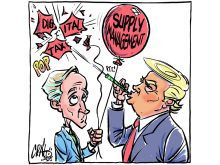In a December year-end interview with CTV, prime minister Stephen Harper talked about the challenges and opportunities of attaining his first majority government last year.
He wants to head an aggressive, activist government.
“It’s a great relief,” he said, reflecting on the end of five years of unstable minority government. “My other consideration is I want to make sure that we use it. I’ve seen too many majority governments, bureaucracy talks them into going to sleep for three years and then they suddenly realize they are close to an election.”
Read Also

Agriculture needs to prepare for government spending cuts
As government makes necessary cuts to spending, what can be reduced or restructured in the budgets for agriculture?
That, says Harper, is not his style. Clearly, he wants to use his 53 month term between elections to change the country as much as he can.
This will not be a “steady as she goes” government.
“We’ve tried to keep busy and we’re going to try and keep busy through the whole four years.”
By almost any measure, the first six months of this majority Conservative Parliament revealed a government anxious to get at its agenda, particularly items long-promised to its rural and western base.
Legislation to end the Canadian Wheat Board monopoly this year was pushed through Parliament at break-neck speed.
Bills to end the long gun registry, to implement some controversial free trade deals, to add 30 new House of Commons seats that will give Alberta and British Columbia more parliamentary clout in 2015 were part of the autumn fast-track agenda.
So let’s take the prime minister at his word that 2012 will be as aggressive as the last half of 2011.
What could be in store for prairie and rural Canadians?
Following is a modest list of certainties, probables and possibles.
The long gun registry will end soon after Parliament reconvenes at the end of January.
There are court challenges and provincial resistance but the CWB file showed that such challenges don’t force the Conservatives to break a sweat.
In May, Statistics Canada will report a decline in the number of Canadian farmers as results of the 2011 farm census are released. Newspaper headlines and some lobbyists will see this as a condemnation of farm policy.
In fact, the numbers will largely be fiction, reporting that the number of farmers has fallen by 10,000 or more in recent years to somewhere in the vicinity of 200,000.
The number of Canadians trying to make a living or a significant part of their living from farming is less than half that total.
However, the “woe is farming” headlines will tell a different story.
In the probable category, the government likely will introduce legislation to reform the Canadian Grain Commission and its legislation. Opposition from industry and political critics fearful that the underlying motive would be to reduce farmer power in the system and undermine Canada’s grain quality regulations could make this the most volatile agricultural debate of the year, outside the remnants of the CWB debate of course.
One of the government motives, in a year of spending cuts and a tight March budget, will be to download CGC costs onto the industry, reducing the need for annual government subsidies.
And despite Harper’s continued stacking of the Senate with unelected Conservative partisans like last week’s new batch, expect a serious effort to get some Senate reform legislation passed this year.
















